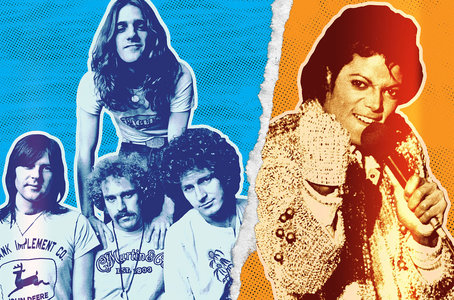

Getty; Design by Alexis Cook – Eagles (left) and Jackson
3/25/2019 by Eight months before HBO’s Leaving Neverland documentary raised new questions about Michael Jackson’s legacy, executives at the late pop star’s record label and estate were pondering another unexpected — and unrelated — development involving his business.
Jackson’s 1982 album, Thriller (33 million copies sold), had just lost the status it held for almost a decade as the best-selling album of all time in the United States, ceding the title to the Eagles’ Their Greatest Hits 1971–1975(38 million), according to the RIAA. Though the two albums have jockeyed for the top spot since the 1980s, trading the lead five times, executives from both Jackson’s estate and Sony Music were stunned by the news that Their Greatest Hits had gained nine new platinum certifications in a single day from the RIAA for the years 2006 to 2018 — meaning 9 million additional U.S. album sales had been made or discovered over those 12 years.
“After Thriller being the recognized No. 1 album seller in the United States for a decade, we were obviously surprised and concerned when we were overtaken despite all metrics we use stating otherwise,” Sony Music Entertainment CEO Rob Stringer said in a statement earlier in 2019, before the documentary premiered. “All we are asking for is transparency in the process so we can understand how sales numbers changed so dramatically at such short notice.”
Sony’s questions arose due to its own calculations, based on Nielsen Music data, that Their Greatest Hits had sold just 1.3 million units since 2006, with streams and track sales bringing the total to 2.3 million album equivalent units — 6.7 million units short of the RIAA’s figure.
Billboard found at least one reason for the big uptick: The data team at Warner Music Group, the Eagles’ label, had undertaken an exhaustive forensic search to find all sales and royalty reports dating back to 1976, when the album was first issued, sources say. To retrieve the data, WMG’s team visited Iron Mountain, a renowned document-management company that stores historic objects and files in underground protected vaults, and interviewed former label financial executives to ensure they had correctly interpreted the sales and royalties numbers found there. The record company then provided the documentation to the RIAA for certification on Aug. 20, 2018. The RIAA told Billboard that the certification was approved by its auditor, Gelfand Rennert & Feldman.
Jackson estate co-executor and Ziffren Brittenham partner/head of music John Branca is skeptical. “When you review the analysis of the [Eagles] record’s performance over the last 20 years, this sudden certification of newly discovered albums that were uncounted calls into question the accuracy of the RIAA certifications,” he said in January. “Record companies regularly restrict audits of sales to a three-year period. I’ve never seen an audit that goes back 20 years.”
WMG’s efforts show one way that investing in data-management technology can pay off for music companies. It’s also a reminder that sales or streams spikes for a certain song or artist may reflect sophisticated efforts behind the scenes to boost numbers, even legitimately, rather than an organic shift in consumer behavior.
There are plenty of other reasons that Nielsen’s data doesn’t match the RIAA’s. For example, Nielsen didn’t exist before 1991, while the RIAA has been certifying platinum albums since 1976 — the same year Their Greatest Hits was released. Nielsen also counts sales, while the RIAA counts shipments, regardless of whether they are ever sold.
Nielsen also doesn’t count sales that occur at concerts or through artist and label websites unless they are reported, nor did it track sales from TV marketing, mail orders or record clubs until later in its existence. It’s also possible that WMG uncovered Eagles streams from before Nielsen started tracking streaming in 2015. Nielsen also has some holes in its data due to title consolidation — bringing multiple versions of an album with different bar codes together for tabulation purposes.
This isn’t the first time that Eagles certifications have frustrated Sony and the Jackson estate. Their Greatest Hits was certified 14 times platinum in December 1993; less than two years later, in June 1995, it was certified 22 times platinum, implying 8 million new sales during a period where Nielsen calculated sales of only about 1 million.
In 2009, the last time Billboard examined the issue, the RIAA said it couldn’t immediately explain that discrepancy. But sources say that WMG had done a similar analysis of the Eagles’ entire sales history to earn the platinum burst in the ’90s.
“The notion that they can go back 10, 15, 20 or 30 years and find units that were never counted before is absurd,” says one executive in the Jackson/Sony camp. “They reviewed these records before. Why didn’t they find those uncounted records then?”
One answer: WMG’s data systems lagged behind those of other major labels in the ’90s. “I don’t believe the earlier certifications were done properly,” says a source familiar with WMG’s efforts. “This was comprehensive and accurate, and the auditor agreed.”
Even now, old-fashioned RIAA certifications matter to labels and artists because the platinum certification is something music consumers recognize as a significant achievement, on the level of winning a Grammy Award.
At the very least, Thriller remains the sales leader worldwide, says Branca: The United States accounts for only 30 percent of Jackson’s sales and streaming, both of which are up even after the documentary. “When you look at it on a global basis, it’s not even a fair conversation,” he said. “No album comes close.”
Full Article HERE
# # #
ESTATE OF MICHAEL JACKSON PRESS CONTACT:
Diana Baron
d.baron media relations inc.
